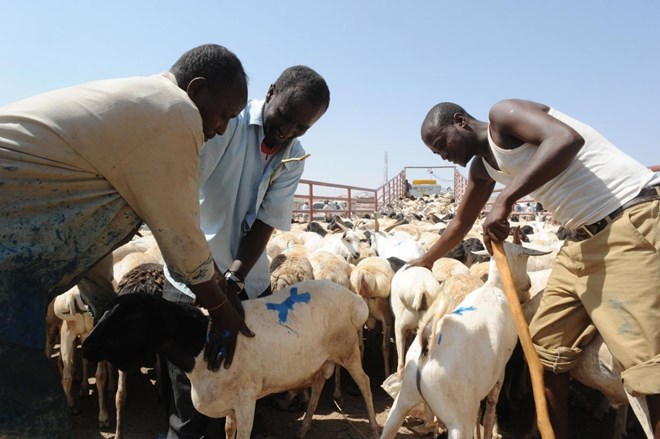
Thursday June 20, 2024

FILE - Traders preparing to load goats and sheep for export onto a truck in Somalia. ©Photo: ©AFP/Simon Maina
Mogadishu (HOL) — Somalia's economy is expected to grow by 3.1% in 2023, rebounding from a 2.4% increase in 2022. The recovery is driven by improved weather conditions and policy reforms aimed at reaching the Heavily Indebted Poor Countries (HIPC) Completion Point.
The World Bank's latest Somalia Economic Update forecasts modest growth in the medium term, with projections of 3.7% in 2024 and 3.9% in 2025. However, this growth faces risks from ongoing climatic shocks, security threats, and global economic fluctuations. The Federal Government of Somalia (FGS) has maintained fiscal stability, and inflation has eased due to declining food prices, better weather, and easing global commodity prices.
Favourable rains in 2023 have bolstered the agricultural sector, while the livestock sector has significantly recovered with rising exports. The FGS has reported strong growth in domestic revenue, though it remains insufficient to meet increasing expenditure needs. Improved performance by Somalia's banks indicates growing confidence in the financial sector.
"Addressing climate challenges and risks is essential for sustainable and resilient economic growth," said Somalia's World Bank Country Manager, Kristina Svensson. "The Government of Somalia needs to support sustained and long-term growth through macroeconomic stability, broad-based structural reforms, and resilience to climate change."
The report emphasizes the role of climate action in driving economic growth. Somalia should invest in resilience and preparedness for climate disasters rather than relying on humanitarian aid, which consumes significant external assistance. Investments in disaster risk management, social protection, and resilient rural livelihoods are essential.
The government's efforts to increase public spending in key sectors such as energy, transportation, education, and health will be crucial for maintaining growth. Political stability and reduced security risks are also essential for economic progress.
External trade is expected to improve with favourable weather and a stronger global environment. Continued financial sector reforms and capacity building will enhance confidence and financial depth. Reforms in tax policies and administration are expected to boost domestic revenue.
"Somalia's economic outlook remains positive, with growth set to accelerate, albeit at a modest pace," said Abdoulaye Ouedraogo, World Bank Economist and author of the report. "Completing the HIPC process and joining the East African Community should boost investor confidence and support regional integration. Economic reforms and increased public investment should attract foreign direct investment and encourage broad-based private sector activity."
The report offers policy recommendations for the post-HIPC environment, stressing the importance of prudent fiscal policy, strengthening domestic resource mobilization, containing the wage bill and security spending, and advancing public finance management reforms. Enhancing debt management legislation and prioritizing concessional financing sources are critical steps. Continuing discussions on federalism will improve state stability and public service delivery.
Despite the positive outlook, significant risks remain. If grant flows are disrupted, overreliance on external grants could jeopardize macroeconomic stability. The risk of re-accumulating debt arrears also necessitates the government's careful management and strategic planning.
Somalia's path to economic stability and growth is promising but requires sustained efforts in policy reform, climate action, and investment in critical sectors to build a resilient and prosperous future.